 |
ICHARM
Newsletter International
Centre for Water Hazard and
Risk Management under the auspices of UNESCO
Vol.1-No.2 August 2006
| 
|
In our periodical newsletter, we continue our focus on providing our national
and international partners and colleagues with up-to-date information on the progress
of our activities at ICHARM. (Click here for back
numbers of UNESCO-PWRI newsletters) |
1. Message from Dr. Takeuchi, Director of ICHARM
First of all, I would like to express my deepest sympathy to the victims of
Tsunami in West Java Island, also to the victims of Flood and Land Slide disasters
in China, Vietnam, Philippines, Korea, and central/western Japan. Especially in
the case of Tsunami in Pangandaran and West Java, one of the reasons behind such
destruction was due to the delayed issuance of the forecast and warning systems.
Therefore, we think, it would better if ICHARM could take part in the approach
to resolve the issue. ICHARM has initiated highly motivated efforts comprising
full-scale activity since its establishment on 6th March this year. We have taken
a big step towards new plans as well as reinforcing the cooperative structure
and on-going activities such as a training course on Hazard Maping, Research &
Development in flood forecast and warning systems. It is really noteworthy
that the people from various fields took part and set-up a cooperative structure
to strengthen the long term domestic support system, especially the Ministry of
Land, Infrastructure and Transport played a central role. We invited domestic
professionals to attend the establishment commemorative symposium "Towards
Global Water Related Disaster Reduction" on 10 May, 2006 at the United Nation
University conference hall. There were about 80 participants, who were mainly
interested in international cooperation related activities and gave us various
opinions on the aims and objectives of ICHARM. In addition, the International
Strategy Investigative Commission was established in the River Bureau on 27 April,
2006. It has already started to consider the things in a comprehensive manner,
taking ICHARM as an active player to achieve the mission. They are now jointly
working for the development of integrated international strategies for water induced
disasters mitigation. Common study sessions are opened for internationally experienced
professionals once in a month. Previous sessions of April 5th, May 23rd , June
22nd and July 26th were filled with enthusiasms and ICHARM is working a lot in
order to do its best to meet the expectations of participants. There was
a 17th IHP (International Hydrological Program) Intergovernmental Council Meeting,
from July 3rd to 7th at the UNESCO headquarter in Paris and ICHARM was represented
by myself, as a chairperson of Japan National IHP Committee, and Mr. Terakawa.
ICHARM was repeatedly quoted in various types of reports as one of the key elements
in IHP activities of the past 2 years. As a consequence, ICHARM was successful
to draw big attention and to receive cooperative offers. Especially, the proposals
for collaboration from the Flood Directive of EU, Yangtze River committee of China,
Indian National Hydrological Research Institute, and U.S. Army Corps of Engineers'
Institute for Water Resources are modestly expected to expand our activities into
the wider international arena. Right after the first day's morning meeting with
U.S. Army Corps of Engineers' Institute for Water Resources, memorandum signing
ceremony about comprehensive research partnership was taken place in presence
of delegates at convention hall between me (ICHARM) and Mr. Pietrowsky (IWR, USACE).
In the board meeting, 6 people from all over the world were elected to the advisory
board members of ICHARM and additional 7 people, who were nominated by the board
chairman Dr. Tadahiko Sakamoto, were assigned to the committee. On the 15th September
2006, the advisory board meeting will be held, where we expect vigorous advices
for the betterment of ICHARM's performances as a global leader in the sector. On
30, June and 2, July, Kovacs Colloquium (symposium) "Frontier of Flood Research",
which was co-hosted by IAHS and UNESCO, was also held at UNESCO headquarter. At
this symposium, we have presented the action policy of ICHARM under the title
"Call for an Alliance for Localism" and firmly stated a resolution of
Localism with eager to work on realities of the people facing the risk of water
related disasters. The Localism is the policy that is coming out from everyone's
common perception through several practices. It has mentioned that causes and
results of water disasters could entirely be different from place to place and
countries to countries. Therefore, we need to be aware of the diversity correctly
and should have implemented activities accordingly, which can truly serve the
real need of concerned people. A simple idea is that the problems can be solved
by diffusion of universal skills and the establishment should be rebuked. We would
like to make it as an image of ICHARM that we think in the same way that people
in crisis do. As for the discussion on the ICHARM activities in the advisory board
meeting on 15 September, we would like to focus on the issues of Localism. This
July, 2 new staff members are internationally recruited, and now there are 4 international
staffs in total. In addition, we are preparing to recruit additional 6 international
staffs. ICHARM's official opening ceremony and commemorative symposium "Alliance
for Localism" will be held at the United Nation University on 14, September
2006 and I would greatly appreciate your participation. I am truly grateful for
having your continuous supports. 
Dr.Kuniyoshi TAKEUCHI
Director of ICHARM |
(Latest Activities
etc.)
2. Opening Ceremony of ICHARM and Commemorative Symposium is
planned to be held in Tokyo on Sept. 14 Official Opening Ceremony of ICHARM
and Commemorative Symposium would be held on September 14 (Thursday), 2006 at
United Nations University (http://www.unu.edu/index.htm),
Shibuya, Tokyo. The Ceremony starts on 10:00 which would be followed by the Symposium
from 11:10 - 18:00. Anyone who have concern in the activities to promote mitigating
water related disasters in the world are heartily welcome to participate in the
event, free of charge with registration in advance for preparation. Details of
the event programme is to be shown on the Home Page of ICHARM (http://www.icharm.pwri.go.jp).
|
3. Introduction
of New Staff | Dr.
Rabindra Osti
(International Technical Exchange Team) Dr. Rabindra
Osti, Nepalese nationality, joined ICHARM in June 2006 as a researcher for International
Technical Exchange Team. Prior to joining ICHARM, Osti was a post-doc fellow at
Ritsumeikan University, Japan. Osti undertook his PhD at Ritsumeikan University
in Civil Engineering, focusing on sediment related disasters especially landslides
and debris-flows and their control measures that appropriate for steep mountain
regions. He completed his master degree from Lueneburg University, Germany in
'Water Resources Management in Tropical and sub-Tropical Regions' under DAAD scheme.
He has also been involving in application related researches in water resources
and water related disaster management, which includes project implementation,
community-based disaster management, community participation, socioeconomic aspects
of water related disasters, agency's roles etc. especially in the context of developing
countries. He has some years of working experience with one of UNDP Nepal's projects
committed for rural community development. In his early career stage, he was involved
in consulting as well as public works in Nepal. In addition to other assigned
responsibilities, Osti's research work at ICHARM will address the critical need
for assessment of the effectiveness and performance of Flood Hazard Maps to reduce
the impact of potential flood disasters, and research for the Issue toward promotion
of dissemination in Flood Hazard Map in developing countries. |
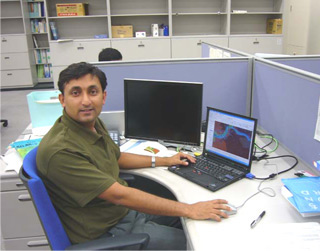
Dr.
Rabindra Osti | |
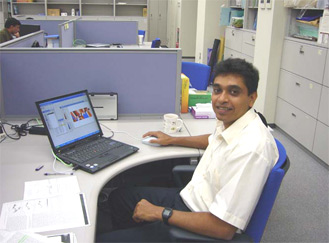
Dr.
Prasantha Hapuarachchi |
Dr. Prasantha Hapuarachchi
(Hydrologic Engineering
Team) Dr. Prasantha Hapuarachchi (usually called as Hapu) joined ICHARM
in July 2006 as a researcher for Hydrologic Engineering Team. He was born in a
small town, Kuliyapitiya in the North Western Province of Sri Lanka. After completing
his high school studies at the Maliyadeva College, he joined the Peoples Bank
of Sri Lanka in 1991 and worked for two years. During his college time, he was
interested in sports, music and scouting. He entered the University of Peradeniya,
Sri Lanka in 1993 as a Civil Engineering undergraduate and during this period,
he was involved in many societal activities and sports apart from academic activities.
Following the completion of undergraduate degree in 1997, he worked for the University
as an instructor for one year. Then he joined a structural design firm, Nanayakkara
Associates, as a design engineer. At the Nanayakkara Associates, he was involved
in designing and supervising a hotel complex where he could gain a lot of practical
experience. In September 1998, he got a UNESCO scholarship to do his higher studies
at the Hohai University, China in the field of Water Resources and Environmental
Engineering. His research was focused on application of evolutionary algorithms
for calibrating hydrological models. Following the completion of master degree
in 2000, the scholarship was extended for a doctoral degree and supported by the
China Scholarship Council. During his doctoral candidature, he mainly focused
on distributed hydrological modeling and flood forecasting via GIS aided techniques
and data. After completing the doctoral degree, he joined the University of Yamanashi,
Japan as a postdoctoral researcher in December 2003. At the University of Yamanashi,
he was involved in watershed modeling (modeling two large river basins, Mekong
River and Yellow River) and managing an online learning system, “Virtual Academy”.
In July, 2006 he joined the ICHARM and currently working as a researcher. |
4. ICHARM's Inauguration
Commemorative Symposium
On May
10th in 2006, we held ICHARM's Inauguration Commemorative Symposium entitled "Towards
Global Water Induced Disaster Reduction - Cooperating through ICHARM-" at
United Nations University (http://www.unu.edu/index.htm).
Participants of this symposium were mostly from universities, private companies,
independent organizations and foundations those working in various fields such
as disaster prevention, water management, agriculture, meteorology, construction,
insurance, marine etc. Opinions were exchanged among participants, which were
80 in numbers. In the former part of the symposium, members of ICHARM introduced
summary reports on ICHARM, its action plan and its implementation process. Specific
issues on immediate actions were elucidated by the director of the centre Professor
Kuniyoshi Takeuchi. In the later part, we held a panel discussion moderated by
Professor Kaoru Takara, a vice president of the Disaster Prevention Research Institute
(DPRI), Kyoto University. In this discussion, we exchanged opinions from broad
horizon on the issues concerning what should ICHARM undertake and what should
be expected for reducing recurrent water disasters worldwide. Many interesting
ideas were suggested and they are summarized below.
- Initiation of needs driven approach is essential to characterize ICHARM's
activities.
- Disaster prevention techniques developed in Japan are suitable
only for domestic use; so it is required to customize such techniques thereby
make them fit in other conditions in respective countries. Research will be needed
to achieve this ambition.
- It is important to know that how to determine the
needs of a particular area from the view point of disaster prevention.
- Combining
needs assessment and resources assessment, proper needs should be determined with
consideration of realization potential all the time.
- Implementation of comprehensive
risk management needs knowledge and experience in a broad range of fields; therefore
alliance between ICHARM and related institutions is imperative. Meanwhile, there
would be a need to establish an effective mechanism that bonds those institutions.
It is also important for ICHARM to develop a wide range of human resources and
play an active role in the processes.
- Response of community to solve the problems
in a local arena is also important.
- It is noteworthy to work
closely with various related organizations in connection with training operation,
database building and field inspection.
In the meantime,
we received specific suggestions from audiences regarding possible coordination
with organizations. 
Active discussion was done by about 70 participants
|
|
| 5. Town Watching in Kurihashi Town From
June 6 to 9, 2006, we held a training course on Flood Hazard Mapping (FHM) for
the trainees from overseas. This training module executed by ICHARM was a component
of training course namely ‘Disaster Mitigation, Preparedness and Restoration
of infrastructure’ formerly managed by the Japan Construction Training Center
(JCTC) on request from Japan International Cooperation Agency (JICA). Eight trainees
were from seven different countries, which were Algeria, Grenada, Maldives, Nepal,
Nicaragua, Sri Lanka and Thailand. In this training, trainees gained practical
knowledge from 'Town Watching' in Kurihashi city of Saitama prefecture, where
FHM has been in practice. Especially, Town-Watching helped them to better orient
on several important aspects that they should focus while making FHM in their
own country. First day, they learned the purposes of FHM and summary history
of FHM in Japan through lecture. At the beginning of the second day, professor
Yujiro Ogawa from Fuji-Tokoha University gave a lecture on the meaning of town
watching and on the points that they should have paid attention while conducting
Town Watching. Later, they went to Kurihashi town and attended a brief explanation
session by public officers at Tone River Upper Reaches Work Office on the flood
past records and the latest flood forecasting system in Tone River. In the afternoon,
they performed a Town Watching in three independent groups, each assisted by Japanese
speaking staffs. In this practice, they explored the effectiveness of FHM distribution,
people's awareness on crisis and public views through interviews directly with
residents, while having discussion on issues such as availability and suitability
of evacuation points, routes and signboards. Third day was allocated for group
discussion and report preparation on related problems and potential solutions
that they found during Town Watching in Kurihashi Town. Last day, each group gave
presentation on their reports and shared the opinions among other groups about
problems and solutions regarding evacuation points, evacuation routes and residents'
awareness etc. This program provided an opportunity to each trainee to think what
they have to pay attention when they make FHM in their own country, comparing
Japanese conditions.  
Town watching and presentation of discussion result
|
|
|
6. Planned
Collaboration with the Philippines
ICHARM has been
exchanging views and directions of flood mitigation in the Philippines with the
Japan International Corporations Agency, the Flood Control and Sabo Engineering
Center (FCSEC) of the Philippine Department of Public Works and Highways, and
other related agencies. The Philippines has been constantly subjected to disasters
and calamities caused by destructive typhoons and monsoons. According to the Office
of Civil Defense and National Disaster Coordinating Council, during the past 24
years (1980-2003), the flood casualty reached over 42,000 people while the economic
damage amounted to over 188 billion pesos. The government of the Philippines has
put a lot of resources to construct fully contiguous levee systems to protect
flood prone areas. However, due to the limited appropriation and technical background,
damaged levees have been left as they are. The government is currently shifting
its emphasis to maintenance/rehabilitation of existing structures and smaller-scale
projects such as spot protection by the polder system. ICHARM intends to continue
dialogue to effectively design ICHARM's technical cooperation to the Philippines.
|
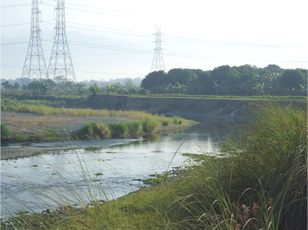
Example of an eroded levee
| 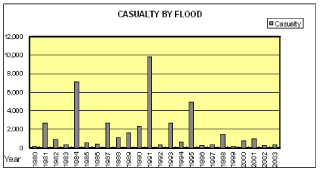
Casualty by flood in the Philippines from 1980-2003
(after FCSEC)
| |
|
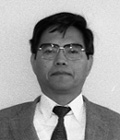
Dr. Fumio YOSHINO
|
7. The late Dr. Fumio
YOSHINO was conferred on the Special Distinguished Service Award of the Japan
Society of Hydrology & Water Resources (May 2nd, 2006 Tokyo, Japan)
The late Dr. Fumio YOSHINO, who used to work for the former Hydrology Division
of the former Public Works Research Institute (PWRI) of the Japanese former Ministry
of Construction for a long time, was given the Special Distinguished Service Award
of the Japan Society of Hydrology & Water Resources last May. The reason of
the award is “his long contribution to the activities of the Japan Society
of Hydrology & Water Resources (JSHWR) and to the establishment of radar hydrology”.
The late Dr. Fumio YOSHINO had worked as the chief of the Hydrology Division of
the former PWRI, the predecessor of the Hydrologic Engineering Research Team of
ICHARM, from 1981 to 1990. During that time, he promoted actively researches on
the development of precipitation monitoring & forecasting by conventional
meteorological radars and one of the most advanced studies in the world at that
time on the improvement of the accuracy of precipitation observation and identification
of hydrometeors with a C-band dual linear polarization doppler radar (DND radar),
the details of which were described in his last book titled “Radar Hydrology”,
issued in 2002 by the Morikita Publishing Co., Ltd. He contributed to the JSHWR's
activities as well for a long time as a vice president of JSHWR, a Councilor,
etc. It is to be regretted that he passed away in 2004, aged 61. Prof. Shuichi
IKEBUCHI, the president of JSHWR, gave a certificate of commendation and a gift
of money to the late Dr.Yoshino's son, Mr. Yasuaki YOSHINO in the award ceremony
at the University of Tokyo on 2th May, 2006. |
(Reports
on Participation in International Conferences) 8.
Flash Flood Workshop (March 13-17, 2006 San José, Costa Rica)
The main objective of this workshop, organized by World Meteorological Organization
(WMO) and U.S. National Oceanic & Atmospheric Administration (NOAA), was to
provide the latest information of current research and result of its application
on actual site related to flash flood prediction capabilities that is applicable
in flash flood prone regions in many countries. Case studies introduced here covered;
from disaster prevention activities for local community that can be conducted
by residents in flood hazard area to most advanced research of risk assessment
by satellite information. Workshop organizer, the World Meteorological Organization
requested Mr. Fuakmi to provide a case and experience of flood forecasting/warning
system and its effectiveness in Japan and he gave a presentation titled “Warning
the population at risk - Experiences in Japan -”. For drafting the workshop
report, he pointed out the importance of effort for the improvement of time-spatial
resolution and accuracy of real-time rainfall observation products by satellites.
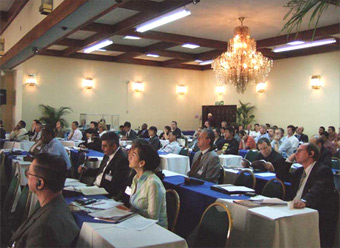
Participants of the workshop
|
|
9. Science Council of Asia 2006 (April 18, 2006 New Delih, India)
The department of hydrology of Indian Institute of Technology, Roorkee, India
has expressed interest in collaboration of ICHARM in conducting research, education
and capacity building in the Indian subcontinent. Dr. Assela Pathirana, Research
Scientist at ICHARM visited IIT Roorkee during April, 2006, while attending the
Science Council of Asia 2006 sessions in New Delhi.
During the visit
he met with the members of the department of Civil Engineering and exchanged information
on the two institutions and on possible collaborative programs. He also delivered
a lecture to the graduate students of the department on the invitation of the
head of the department Prof. N.K. Goel.
During the Science council of
Asia sessions Dr. Pathirana delivered a lecture introducing the activities of
ICHARM to the scientific community of Asia.
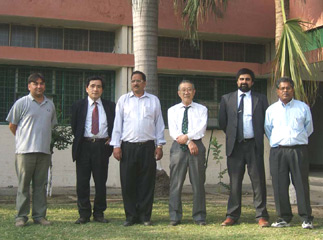
In the Roorkee
| |
|
10. Conference on Innovative Technologies in the Water Sector (May 16, 2006 Rotterdam,
Netherlands)
A conference on 'Innovative Technologies in the Water Sector',
hosted by the Netherlands Office of Science and Technology, was held on May 16
at the World Trade Center in Rotterdam, the Netherlands. Mr. Terakawa from ICHARM
and Mr. Ohgi from Japan Water Agency were invited by the Dutch Government to participate
in the conference from Japan. It was held to continue collective efforts initiated
last June by the launch of an intergovernmental meeting in the field of water
management between Japan and the Netherlands and to further promote bilateral
technological exchange in the water sector. Mr. Terakawa made a presentation entitled
"Comprehensive Flood Risk Management in Urbanized River Basins in Japan"
in the session on Water Protection and Security. Questions and comments were exchanged
among presenters and participants from various countries, such as the Netherlands,
the U.S., Italy, France, Germany, China, etc.

An Exhibition was held in the hall adjacent
to the conference room
| |
11. 4th Mekong Annual Flood Forum (May 18-19, 2006 Siem Reap, Cambodia) This
year's third Annual Mekong Flood Forum, under the sub-theme of "Improving
Flood Forecasting and Warning Systems for Flood Management and Mitigation in the
Lower Mekong Basin", introduced latest research cases of accuracy improvement
of flood forecasting/ warning in developing countries as well as last year's flood
events in Mekong River and characteristics of damages by those events and current
activities towards damage mitigation. Mr. Fukami participated in this forum and
presented "Potential Alternatives for Key Technologies to Improve the Accuracy
and the Lead-Time of Flood Forecasting in the Mekong River" to introduce
research activities related to flood forecasting/ warning in ICHARM. His presentation
included reports about the achievements and ongoing projects based on collaborative
researches among ICHARM, Japan Aerospace Exploration Agency (JAXA), University
of California at Davis (UCD) and some Japanese private consultant firms. He also
took part in the poster session and introduced ICHARM's various activities for
the mitigation of water-related disasters in the world. 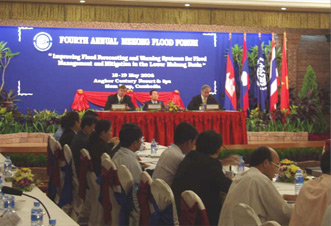
Opening ceremony of
the 4th Annual Mekong Forum | |
12. Symposium on Multi-Hazard Early Warning Systems for Integrated Disaster
Risk Management (May 23-24, 2006 Genève, Switzerland) Mr. Fukami
participated in this symposium as a representative of ICHARM and presented "A
discussion on flood hazard warning and preparedness -Experiences in Japan-"
in the Session 5 "Integration of Risk Information and Early Warnings in Emergency
Preparedness, Planning and Response". At the general discussion of the session,
he indicated that the responsible organization for each process of early warning
should be identified, and that regional organizations, such as the Mekong River
Commission, should take important roles in capacity building for techniques related
to flood forecasting/warning. He also mentioned that the organization which really
needed "multi-hazard approach" was local disaster-prevention communities
at hazardous areas such as fire and flood fighting corps in the case of Japan
while personnel in charge of disseminating early warning required very advanced
expertise in each category of disasters. 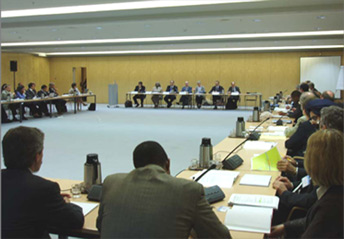
Aspect of the symposium
| |
13. The Regional Workshop on Mitigation, Preparedness and Development for Tsunami
Early Warning System in Indian Ocean Region (June 14-16, 2006 Bangkok, Thailand) | |
| A regional workshop
on mitigation, preparedness and development for Tsunami Early Warning System (TEWS)
in Indian Ocean region was held at United Nations Conference Centre, Bangkok,
Thailand in 14 -16 June. This was organized by United Nations Inter-Agency Secretariat
of the International Strategy for Disaster Reduction (UN/ISDR) in collaboration
with United Nations Economic and Social Commission for Asia and the Pacific (UNESCAP)
and Intergovernmental Oceanographic Commission (IOC). About 100 participants including
three government officials affiliated with the departments of disaster prevention,
planning and/or Tsunami Early Earning System from each county of Indian Ocean
region took part in the workshop. International Centre for Water Hazard and Risk
Management (ICHARM) was represented at the workshop by Mr. Shigenobu Tanaka, principal
research engineer of ICHARM, who also gave a note on structural countermeasures
against disaster prevention in Japan. In this workshop, discussion was made not
only on early warning system but also on overall tsunami disasters as well as
other related disasters prevention and management, although most attendees would
have expected that the workshop will only focus on TEWS. Participants showed interests
in the presentation and gave complimentary reactions to the understandings of
the problems of structural prevention measures and disaster prevention awareness.
| 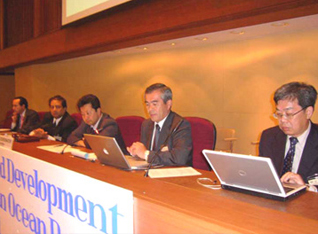
Aspect of the Regional Workshop
| |
14. The 17TH UNESCO-IHP Intergovernmental Council (July
3-7, 2006 Paris, France) The 17th session of the UNESCO-IHP Intergovernmental
Council was held on July 3-7 at the UNESCO Headquarters in Paris, France. Mr.
Takeuchi, Director of ICHARM, and Mr. Terakawa participated in the meeting as
a part of representatives from Japan. Among the participants were the 35
Member States of the Council, 38 observer states, and 14 organizations. In the
meeting, reports were made on a wide range of issues, such as progress in the
implementation of the on-going 5-year plan as well as the formulation of the next
5-year plan, the activities of the existing UNESCO centres including ICHARM, cooperation
with other UN agencies and non-governmental organizations, and were followed by
discussions. Also, of the ICHARM advisory board members, the following
six were elected as IHP regional representatives by the Council: (Group1:
Northern America & Western Europe) Mr. Eugine Stakhiv (USA)
(Group2:
Russia & Eastern Europe) Mr. Maciej Zalewski (Poland)
(Group3:
Latin America & the Caribbean) Mr. Carlos Tucci (Brazil)
(Group4:
Asia & Oceania) Mr. Mohamed Kahlown (Pakistan)
(Group5: Africa)
Mr. Abon Amani (Niger)
(Group6: Arab States) Mr. Anwar Jiries
(Jordan) The resolution adopted on July 7 after the 4-day Council meeting
includes: - Strategic enhancement of cooperative ties among the existing
water-related UNESCO centers as well as incorporation of such activities into
the next 5-year-plan (2008-2013).
- Promotion of joint activities involving
various international organizations and programs, including ICHARM, in mitigating
the risk water-related disasters, in response to the recently increasing number
of them.

The UNESCO-IHP Intergovernmental Council
| |
Information I CHARM newsletters are distributed via e-mail. They can also be
downloaded from our website. To subscribe or unsubscribe to our mailinglist, please
contact us via e-mail. We welcome any comments or requests from you to help us
make this newsletter more effective and informative.
Issued by: International
Centre for Water Hazard and Risk Management under the auspices of UNESCO (ICHARM)
1-6 Minamihara Tsukuba Ibaraki 305-8516, Japan Tel: +81-29-879-6809
Fax: +81-29-879-6709
e-mail: icharm@pwri.go.jp URL: http://www.icharm.pwri.go.jp/
| | | |





